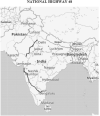Where is my home?: Gendered precarity and the experience of COVID-19 among women migrant workers from Delhi and National Capital Region, India
- PMID: 34219998
- PMCID: PMC8239831
- DOI: 10.1111/gwao.12700
Where is my home?: Gendered precarity and the experience of COVID-19 among women migrant workers from Delhi and National Capital Region, India
Abstract
With growing interest in the lives of individuals and communities during the COVID-19 pandemic, there is consensus among scholars, academicians, and policy makers that the pandemic has had unequal impacts on different sections of the society. The dominant idea that "we are in this together" needs to be critically unpacked to understand the differential impact of the same pandemic on people with varied vulnerabilities. The concept of "intersectional vulnerability" has been key to understanding the unequal distribution of the pandemic risk. Using a gendered intersectional lens, this paper aims to understand the lived experiences of migrant women workers during the pandemic and their narratives of gendered inequality. Through a narrative study in Delhi and the National Capital Region (NCR), India, from May to October 2020, this study brings out stories of precarity faced by five migrant women while battling the social, psychological, and economic effects of the pandemic. Loss of livelihood, home, savings, and prospects of a better future shape the narratives of these women. The pandemic exacerbated the already precarious positions of these women by creating a situation where-(a) patriarchal structures were further reinforced, and (b) losing gender solidarity and companionship through lockdown and social distancing.
Keywords: COVID‐19; Delhi and NCR; gendered precarity; intersectionality; lived experiences; migrant women workers.
© 2021 John Wiley & Sons Ltd.
Figures
References
-
- Agamben, G. (2020). Homo Sacer: Sovereign power and bare life. Stanford University Press.
-
- Arendt, H. (1964). Eichmann in Jerusalem. Viking Press.
-
- Arendt, H. (2006). Eichmann in Jerusalem: A report on the banality of evil. Penguin Books.
-
- Arora, S. (2018). Stories from the margins: Exploring gendered memories of the Leh flash floods in 2010. Indian Journal of Social Work, 79(1), 65–82.
-
- Arora, S. (2020a). 'I lived through a disaster': Disaster memories and lived experiences after the 2010 Leh flash floods. In Disaster studies (pp. 107–125). Springer.
LinkOut - more resources
Full Text Sources

